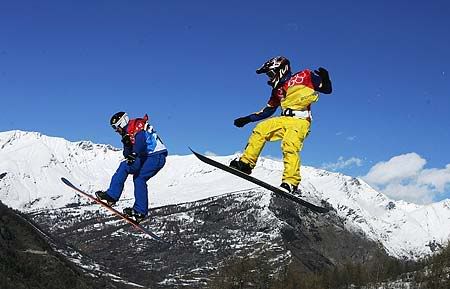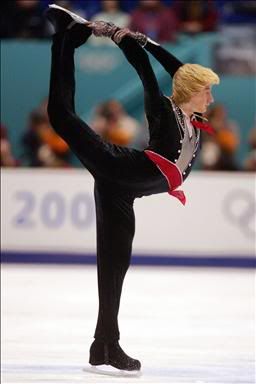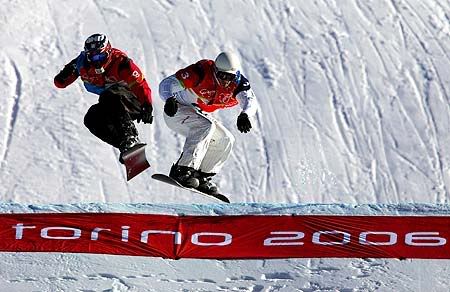Olympic Games--All Muscle, Little Grace
 I used to like the Winter Olympics because of the gracefulness of the ice skating and the sheer joy that the competitors radiated as they gave each event their best shot.
I used to like the Winter Olympics because of the gracefulness of the ice skating and the sheer joy that the competitors radiated as they gave each event their best shot. This year in Torino, the ice skating has become a test of who can do a quadruple jump without falling and who can throw their spinning female pairs partner the furthest without breaking her leg. The winner has often been the last skater standing. This has been boring, to say the least. There have been very few (among them men's single's champion Yevgeny Plushenko of Russia) who have been able to be both graceful and physical at the same time.
This year in Torino, the ice skating has become a test of who can do a quadruple jump without falling and who can throw their spinning female pairs partner the furthest without breaking her leg. The winner has often been the last skater standing. This has been boring, to say the least. There have been very few (among them men's single's champion Yevgeny Plushenko of Russia) who have been able to be both graceful and physical at the same time.The dilemma is that if a man or woman does not attempt the most difficult (and sometimes nearly impossible) jumps they will have little or no hope for a medal. On the other hand, if they do not make the jump successfully they will not score high enough for a medal anyway.
So, some of the best skaters dare the impossible and lose while lesser skaters get lucky and score the big points that make all the difference.
Some of the skaters concentrate so hard on preparing for the next jump that their routines have little coherence or artistry in them at all.
 Fortunately, I have discovered the snowboardcross events . . . new to this year's Olympics. They have been exciting, unpredictable and "head to head." The snowboarders who are competing have not yet jaded into "professional money machines" with the heavy weight of sponsors and commercial pressure weighing them down. Even the cockeyness of World Champion Lindsey Jacobellis of the United States whose showboating caused her to fall on the home stretch of what would otherwise have been a sure and easy Gold Medal made me more happy for the joie de vive than sad for her disappointing second-place finish.
Fortunately, I have discovered the snowboardcross events . . . new to this year's Olympics. They have been exciting, unpredictable and "head to head." The snowboarders who are competing have not yet jaded into "professional money machines" with the heavy weight of sponsors and commercial pressure weighing them down. Even the cockeyness of World Champion Lindsey Jacobellis of the United States whose showboating caused her to fall on the home stretch of what would otherwise have been a sure and easy Gold Medal made me more happy for the joie de vive than sad for her disappointing second-place finish.In fact, all the snowboarding events have been filled with the good spirit of both fun and competition. Traditional alpine skiing, even in the exhilaration of the downhill events, seems dull and wooden in comparison . . . with all the competitors taking themselves far too seriously.
In any case, the folks in Torino appear to have done a magnificent job and NBC's TV coverage has been far superior to past Winter Olympics . . . far less chit-chat and air-time for the big-name announcers and more of the real stuff we all want to watch.
My favorite quote of the Olympics so far was that of United States pairs skater Aliona Savchenko who, born and raised in Russia, is now an American citizen. When asked about his citizenship Savchenko said that he is happy and excited to be starting on the "American Dream."
I thought to myself, how many people, athletes or otherwise, immigrate to Russia to start on the "Russian Dream?" or to China to start on the "Chinese Dream?" People do not ordinarily immigrate to these countries at all. Rather, people emigrate away from these countries in pursuit of their "dreams" when given the opportunity.
I've got to say that Akiona Savchenko seemed to be a happy, smiling competitor even though he and partner Robin Szolkowy only came in seventh overall. Competing as an American was, apparently, the greatest thrill of all.


<< Home